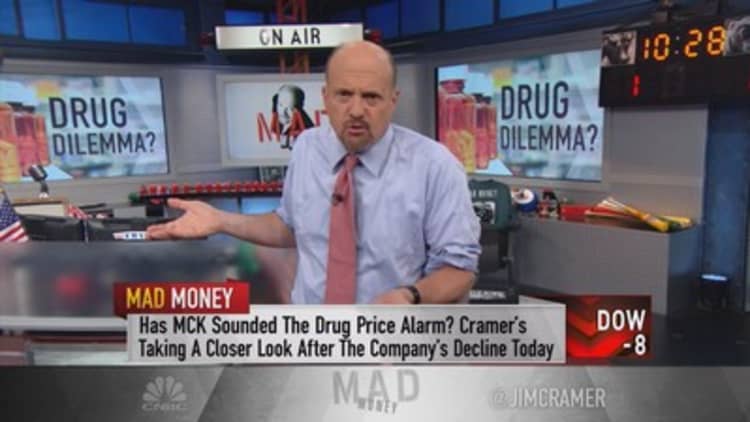
In the blink of an eye, drug wholesaler stocks like McKesson and Cardinal Health went from being low-risk safe-havens to getting crushed. Jim Cramer was speechless.
McKesson reported a large miss on the top and bottom lines, and then cut full-year earnings guidance by 8 percent. But it was the commentary on the conference call that truly terrified investors.
"You need to understand that this whole industry seems to be under attack from within," the "Mad Money" host said.
For years, the drug wholesalers have been a fairly quiet oligopoly. McKesson, Cardinal and AmerisourceBergen control approximately 97 percent of the market and didn't try to compete too hard against one another. That is changing.
AmerisourceBergen recently spoke at a Morgan Stanley conference and basically said it is tired of losing market share, and plans to take it back by aggressive price competition, Cramer said. Once price competitions start, that means price wars, which are the enemy to profits.
In the past when price wars have broken out in this industry, the stocks of these companies have been eviscerated, and it doesn't all happen overnight.Jim Cramer
Drug wholesalers act as a middle man between pharmaceutical companies that make drugs and the hospitals and pharmacies that buy them. Thus, these companies have two streams of earnings: One from the drug companies that pay them to distribute, and one from independent drug stores that pay them to get breaks on generic drugs.
It was the second stream that came under fire.
Most companies work on three year contracts. When the deal is up, drug wholesalers bid on the business. Cramer boiled the issue down to what AmerisourceBergen did after the Morgan Stanley conference. It went to its independent pharmacy customers and basically said it would give discounts now, which prompted pharmacies to switch to them when contracts came up for renewal.
In short, AmerisourceBergen set off an unexpected price war.
McKesson's stock dropped 22 percent on Friday, the worst decline in 17 years, and Cramer doesn't think it is finished going lower.
"In the past, when price wars have broken out in this industry, the stocks of these companies have been eviscerated, and it doesn't all happen overnight," Cramer said.
On its conference call, McKesson said it does not expect aggressive price cutting on its part to continue. But if its competition continues to cut prices, Cramer doesn't think it will have much choice. This is what happens when a group goes from being quiet to vicious.
"If the drug wholesalers are getting into a real price war when it comes to the business of distributing generic drugs to pharmacies, all I can say is wow. It may not end here, so the numbers … might have to come down even bigger than they came down today," Cramer said.
So, for a long time there was equilibrium in the drug distribution space as each major player tried not to compete too hard. Now that the supply of branded drugs going generic has shrunk, and the drug wholesalers have started to compete on price, Cramer is worried.
"In that kind of situation, everyone gets hurt and there is no telling when the pain ends. Based on what we heard from McKesson today, I think this could be a very tough situation, which is why you should continue to steer clear of this group, and health care altogether, at least until after Election Day," Cramer said.
Questions for Cramer?
Call Cramer: 1-800-743-CNBC
Want to take a deep dive into Cramer's world? Hit him up!
Mad Money Twitter - Jim Cramer Twitter - Facebook - Instagram - Vine
Questions, comments, suggestions for the "Mad Money" website? madcap@cnbc.com



